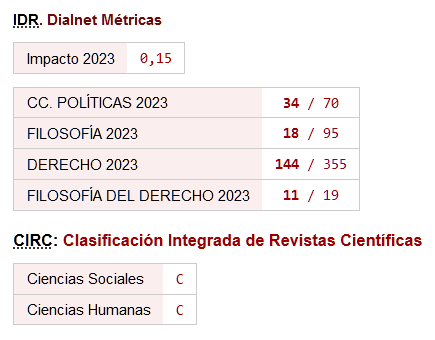¿Giran a la derecha? La ideología de los jóvenes españoles desde la consolidación de la democracia hasta hoy
DOI:
https://doi.org/10.46661/revintpensampolit.7501Palabras clave:
jóvenes, generaciones, cohortes, ideología, división izquierda-derechaResumen
¿Se ubican los jóvenes de hoy más a la derecha? Existe una creencia popular de que los jóvenes de ubican más a la izquierda que sus mayores. Sin embargo, hay poca evidencia empírica sobre cómo funciona la edad a la hora de entender la ideología de los individuos. En este artículo, tratamos de analizar cómo funciona la edad sobre la ideología de los ciudadanos teniendo en cuenta tanto el efecto de la edad en sí mismo, el efecto de ciclo vital; como el efecto cohorte o generacional, derivado de la socialización política. La evidencia de este artículo apunta a que los jóvenes de hoy, si bien se mantienen más a la izquierda que otros grupos de edad, tienen preferencias menos de izquierda que los jóvenes socializados en los sesenta y setenta.
Descargas
Citas
Campbell, A. et al. (1960) The American Voter. Chicago: University of Chigago Press.
Corbetta, P., Cavazza, N. y Roccato, M. (2009) «Between ideology and social representations: Four theses plus (a new) one on the relevance and the meaning of the political left and right», European Journal of Political Research, 48(5), pp. 622-641. https://doi.org/10.1111/j.1475-6765.2009.00845.x
Corbetta, P., Tuorto, D. y Cavazza, N. (2013) «Parents and children in the political socialization process: changes in Italy over thirty-five years», en Abendschön, S. (ed.) Growing into politics. Colchester: ECPR Press.
Cordero, G. y Martín, I. (2011) ¿Quiénes son y cómo votan los españoles de izquerdas? Madrid: La Catarata.
Cornelis, I. et al. (2009) «Age differences in conservatism: Evidence on the mediating effects of personality and cognitive style», Journal of Personality, 77(1), pp. 51-88. https://doi.org/10.1111/j.1467-6494.2008.00538.x
Dalton, R. J. (2000) «The decline of party identifications», en Dalton, R. J. y Wattenberg, M. P. (eds.) Parties without Partisans. Political Change in Advanced Industrial Democracies. Oxford: Oxford University Press, pp. 19-36. https://doi.org/10.1093/0199253099.003.0002
van Deth, J. W. y Elff, M. (2004) «Politicisation, economic development and political interest in Europe», European Journal of Political Research, 43(3), pp. 477-508. https://doi.org/10.1111/j.1475-6765.2004.00162.x
Dinas, E. y Stoker, L. (2014) «Age-Period-Cohort analysis: A design-based approach», Electoral Studies, 33, pp. 28-40. https://doi.org/10.1016/j.electstud.2013.06.006
Eijk, C. van der, Schmitt, H. y Binder, T. (2005) «Left - Right Orientations and Party Choice», en Thomassen, J. (ed.) The European Voter. Oxford: Oxford University Press, pp. 166-190.
Emmenegger, P., Marx, P. y Schraff, D. (2016) «Off to a Bad Start: Unemployment and Political Interest during Early Adulthood», The Journal of Politics, 79(1), pp. 315-328. https://doi.org/10.1086/688226
Feather, N. T. (1977) «Value importance, conservatism, and age», European Journal of Social Psychology, 7(2), pp. 241-245. https://doi.org/10.1002/ejsp.2420070209
Fishman, R. M. y Lizardo, O. (2013) «How Macro-Historical Change Shapes Cultural Taste: Legacies of Democratization in Spain and Portugal», American Sociological Review, 78(2), pp. 213-239. https://doi.org/10.1177/0003122413478816
Flacks, R. (1967) «The Liberated Generation: An Exploration of the Roots of Student Protest», Journal of Social Issues, XXIII(3), pp. 52-75. https://doi.org/10.1111/j.1540-4560.1967.tb00586.x
Galais, C. (2012) «Edad, cohortes o periodo. Desenredando las causas del desinterés político en España», Revista Española de Investigaciones Sociológicas, 139, pp. 85-109. https://doi.org/10.5477/cis/reis.139.85
García-Albacete, G. (2014) Young people's political participation in Western Europe: Continuity or Generational Change? Basingstoke: Palgrave Macmillan. https://doi.org/10.1057/9781137341310
García-Albacete, G. y Lorente, J. (2021) «Has the Great Recession Shaped a Crisis Generation of Critical Citizens? Evidence from Southern Europe», South European Society and Politics, pp. 1-27. https://doi.org/10.1080/13608746.2021.1949672
Gerring, J. (1997) «Ideology: A Definitional Analysis», Political Research Quarterly, 50(4), pp. 957-994. https://doi.org/10.1177/106591299705000412
Glenn, N. D. (1974) «Aging and Conservatism», Annals of the American Academy of Political and Social Science, 415, pp. 176-186. https://doi.org/10.1177/000271627441500113
Grasso, M. T. et al. (2019) «Thatcher's Children, Blair's Babies, Political Socialization and Trickle-down Value Change: An Age, Period and Cohort Analysis», British Journal of Political Science. 2017/01/26, 49(1), pp. 17-36. https://doi.org/10.1017/S0007123416000375
Hay, C. (2007) Why we hate politics. Cambridge: Polity Press.
Henn, M., Weinstein, M. y Forrest, S. (2005) «Uninterested Youth? Young People's Attitudes towards Party Politics in Britain», Political Studies, 53(3), pp. 556-578. https://doi.org/10.1111/j.1467-9248.2005.00544.x
Hyman, H. H. (1959) Political Socialization: a study of psychology of political behavior. Glencoe: Free Press.
Ignazi, P. (2005) «Meanings and Varieties of the Right», en Extreme Right Parties in Western Europe. Oxford: Oxford University Press, pp. 4-19. https://doi.org/10.1093/0198293259.001.0001
Jennings, M. K. (1979) «Another Look at the Life Cycle and Political Participation», American Journal of Political Science, 23(4), pp. 755-771. https://doi.org/10.2307/2110805
Jennings, M. K. (1987) «Residues of a Movement: The Aging of the American Protest Generation», The American Political Science Review, 81(2), pp. 367-382. https://doi.org/10.2307/1961957
Jennings, M. K. (1989) «The Crystallization of Political Orientations», en Jennings, M. K. y van Deth, J. W. (eds.) Continuities in Political Action. A Longitudinal Study of Political Orientations in Three Western Democracies. New York: Walter de Gruyter, pp. 313-348. https://doi.org/10.1515/9783110882193.313
Jennings, M. K. (1990) «The crystalization of political orientations», en Continuities in Political Action. Berlin: De Gruyter. https://doi.org/10.1515/9783110882193
Jennings, M. K. (2002) «Generation Units and the Student Protest Movement in the United States: An Intra- and Intergenerational Analysis», Political Psychology, 23(2), pp. 303-324. https://doi.org/10.1111/0162-895X.00283
Jennings, M. K. (2007a) «Political Socialization», en Klingemann, D. R. H. D. (ed.) The Oxford Handbook of Political Behaviour. Oxford: Oxford University Press.
Jennings, M. K. (2007b) «Political Socialization», en Dalton, R. J. y Klingemann, H.-D. (eds.) The Oxford Handbook of Political Behavior. Oxford: Oxford University Press, pp. 29-44. https://doi.org/10.1093/oxfordhb/9780199270125.003.0002
Jennings, M. K. y Niemi, R. G. (1968) «The transmission of Political Values between Parent and Children», American Political Science Review, 62(1), pp. 169-184. https://doi.org/10.1017/S0003055400115709
Jennings, M. K. y Niemi, R. G. (1975) «Continuity and Change in Political Orientations: A Longitudinal Study of Two Generations», American Political Science Review, 69(4), pp. 1316-1335. https://doi.org/10.2307/1955291
Jennings, M. K. y Niemi, R. G. (1981) Generations and Politics. A Panel Study of Young Adults and their Parents. Princeton: Princeton University Press. https://doi.org/10.1515/9781400854264
Lipset, S. M. et al. (1954) «The Psychology of Voting: an Analysis of Political Behavior», en Linzey, G. (ed.) Handbook of Social Psychology. Vol 2. MA: Adison-Wesley.
Lorente, J. (2019) Los jóvenes y la división izquierda-derecha en Europa en los últimos treinta años: generaciones y voto. Madrid: Centro de Investigaciones Sociológicas.
Mannheim, K. (1952) «The Problem of Generations», Essays on the Sociology of Knowledge, 24(19), pp. 276-322; 22-24.
Martín, I. (2004a) Significados y orígenes del interés por la política en dos nuevas democracias: España y Grecia. Universidad Autónoma de Madrid - Centro de Estudios Avanzados en Ciencias Sociales.
Miller, W. L. y Niemi, R. G. (2002) «Voting: Choice, Conditioning, and Constraint», en LeDuc, L., Niemi, R. G., y Norris, P. (eds.) Comparing Democracies 2: New Challenges in the Study of Elections and Voting. London: Sage, pp. 169-188.
Montero, J. R., Gunther, R. y Torcal, M. (1998) «Actitudes hacia la democracia en España: legitimidad, descontento y desafección», Revista Española de Investigaciones Sociológicas, (83), pp. 9-49. https://doi.org/10.2307/40184120
Neundorf, A. y Niemi, R. G. (2014) «Special Symposium - Beyond Political Socialization: New Approaches in Age, Period, Cohort Analysis», Electoral Studies, 33, pp. 1-356. https://doi.org/10.1016/j.electstud.2013.06.012
Ray, J. J. (1985) «What old people believe: Age, sex, and conservatism.», Political Psychology, 6(3), pp. 525-528. https://doi.org/10.2307/3791086
Russell, A. T., Johnston, R. J. y Pattie, C. J. (1992) «Thatcher's Children: Exploring the Links between Age and Political Attitudes», Political Studies, 40(4), pp. 742-756. https://doi.org/10.1111/j.1467-9248.1992.tb01796.x
Ryder, N. B. (1965) «The Cohort as a Concept in the Study of Social Change», American Sociological Review, 30(6), pp. 843-861. https://doi.org/10.2307/2090964
Sears, D. O. y Levy, S. (2003) «Childhood and Adult Political Development», en Huddy, L., Sears, D. O., y Levy, J. S. (eds.) Oxford Handbook of Political Psychology. Oxford University Press, pp. 59-95. https://doi.org/10.1093/oxfordhb/9780199760107.013.0003
Sherkat, D. E. y Blocker, T. J. (1993) «Environmental Activism in the Protest Generation. Differentiating 1960s Activists», Youth, 25(1), pp. 140-161. https://doi.org/10.1177/0044118X93025001009
Truett, K. R. (1992) «Age differences in conservatism», Personality and Individual Differences, 14, pp. 405-411. https://doi.org/10.1016/0191-8869(93)90309-Q
Descargas
Publicado
Cómo citar
Número
Sección
Licencia
Derechos de autor 2022 Javier Lorente Fontaneda, Irene Sánchez-Vítores

Esta obra está bajo una licencia internacional Creative Commons Atribución-NoComercial-CompartirIgual 4.0.
Política de acceso abierto
Se permite el acceso libre y abierto de cualquier interesado a todos los contenidos de los números de la revista, sin costo alguno, pudiendo imprimir y trasladar todos los artículos, con la única condición de precisar la fuente y la autoría.
La revista: a) no cobra a las autorías costes por el procesamiento de los artículos ni por el envío de los mismos, b) mantiene el copyright para los autores sin restricciones, c) facilita a los autores conservar sus derechos de publicación sin limitaciones.
La Revista Internacional de Pensamiento Político es una obra original del Laboratorio de Ideas y Prácticas Políticas de la Universidad Pablo de Olavide. Todos los artículos incluidos en la Revista son obra original de sus respectivas autorías. Esta Revista se ofrece libremente a la comunidad científica y académica sin coste alguno y libera los contenidos de acuerdo a la licencia "Reconocimiento-NoComercial-CompartirIgual 4.0 CC BY-NC-SA" del proyecto Creative Commons dispuesta en la siguiente url: https://creativecommons.org/licenses/by-nc-sa/4.0/legalcode
Si deseas traducir o compilar alguno de los artículos aquí disponibles, por favor, ponte en contacto













